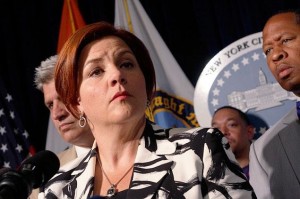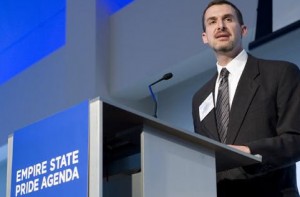ESPA goes out with a whimper not the bang of having passed GENDA
by Pauline Park
On Dec. 12, the Empire State Pride Agenda abruptly announced it would be shutting down the Pride Agenda — which so many people over the years have called ‘ESPA’ — and its Foundation, though its political action committee will apparently remain active.
The announcement was reported by media outlets from the New York Times (“Empire State Pride Agenda to Disband, Citing Fulfillment of Mission,” 12.12.15) to Gay City News to PlanetTransgender.com. This is big news for the lesbian, gay, bisexual and transgender community, because ESPA is the only statewide LGBT advocacy organization in New York and widely viewed as its voice, especially by members of the state legislature. In its Dec. 12 press release, ESPA declared,
The Boards’ decision comes on the heels of securing the Pride Agenda’s top remaining policy priority — protecting transgender New Yorkers from discrimination in housing, employment, credit, education and public accommodations — in the form of new regulations announced in partnership with Governor Andrew M. Cuomo at the organization’s Fall Dinner on October 22…
Of course, an executive order and even a state Division of Human Rights regulation can be rescinded by any of Cuomo’s successors as governor, so it does not have the force of an enacted statute law, and many saw this as a George W. Bush ‘mission accomplished’ moment, in particular because the Pride Agenda is closing shop without having gotten the Gender Expression Non-Discrimination Act (GENDA) through the state Senate and signed into law.
But Norman C. Simon, chair of the Pride Agenda board and co-chair of the Foundation, responded to criticism of the decision and the announcement of it by telling Gay City News,
We did not and are not declaring mission accomplished on LGBT equality. What we are saying is that our top priorities have been completed, and that the remaining work that needs to be done we will transition to other organizations in the coming months in an orderly process (Paul Schindler, “ESPA Leadership Pushes Back on Charge They’ve Declared ‘Mission Accomplished’,” Gay City News, 12.13.15).
In his story for Gay City News, Paul Schindler wrote, “Matt Foreman focused his criticism both on the way the Pride Agenda reached its decision and on the message the announcement of that decision sent,” quoting the former executive director as saying,
There was zero consultation with folks who spent their lives building the Pride Agenda. If they are going to make a decision of that magnitude, there has to be a consultative function. They need to talk to the stakeholders, to the communities around the state… This is an abrogation of a fundamental obligation that an organization has to its constituency… And, it plays into the national narrative that the job is done.
But the same could be said of ESPA’s decision to endorse Cuomo’s executive order without any consultation even with the coalition attempting to advance GENDA in the state Senate. I have been involved with what originally was called the GENDA Coalition from the beginning, far longer than all of the current ESPA staff, and I represented the New York Association for Gender Rights Advocacy (NYAGRA) in that coalition from its formation, and at no time was there even a conference call to discuss the executive order, which will have the effect of undermining any remaining efforts to push GENDA through the Senate. Why would the Republican majority in the Senate feel pressured to pass GENDA when ESPA and the governor are both touting the executive order/regulation as providing sweeping protections for transgendered people in the state? And the lack of even the most rudimentary consultation on the decision to endorse the governor’s executive action is why it feels to me like a backroom deal cut between ESPA and the governor rather than a genuinely community-driven policy victory. Hence the decision to settle for an executive order rather than to demand that the governor use his power and influence to push GENDA through the Senate — in which Republicans maintain a majority in large part due to Cuomo’s efforts to keep the Senate in Republican hands — is not only substantively questionable but really represents a betrayal of the transgender community and the process through which the GENDA coalition was working to achieve a legislative remedy to the lack of protection from discrimination based on gender identity or expression in state law.
The most negative reactions to the news of the shutdown of the two most important parts of the Empire State Pride Agenda empire have focused on the organization’s abandonment of its transgender legislative agenda, Kelli Anne Busey writing,
Realizing the trans community’s worst fears, the New York Empire State Pride Agenda announced the shocking news Saturday that they are ceasing operations after 25 years of operations… [executive director Nathan] Schaefer just said the job isn’t finished without saying transgender and every fucking person in the room knows that’s what he’s eluding to. (it’s their little secret) They’ll just walk. So gay New Yorkers will spend money on making sure the laws protecting them aren’t eroded but will throw the T under the bus. Nice. (Kelli Anne Busey, Empire State Pride Agenda Disbands, Screwing NY Transgender People,” Planet Transgender, 12.13.15)
On Twitter, a number of people ‘tweeted’ critical comments:
This is what superficial justice looks like: “Empire State Pride Agenda to Disband, Citing Fulfillment Mission” (Jen Jack Gieseking @jgieseking, 12.13.15)
“We got marriage equality our work is done.” “What about trans equality, we aren’t done?” “Well we are!” (Mia Marie Macy @Miamariemacy, 12.13.15)
The closure of NYC’s @prideagenda is a sad indictment of legal activism. Marriage equality does not heal all wounds. (Senthorun Raj @senthorun, 12.13.15)
I have worked with every executive director and deputy director of the Pride Agenda from 1998 onwards as well as every transgender community organizer and every coordinator of the New York State LGBT Health & Human Services Network, which Tim Sweeney founded when he was deputy director of the Pride Agenda and in which I represented Queens Pride House (the only LGBT community center in the borough of Queens), so I actually know ESPA’s history better than the current members of the board and staff. And . So my perspective is the long view, informed by my experience leading the campaign for the transgender rights law enacted by the New York City Council in 2002, in partnership with Tim Sweeney and Matt Foreman and other ESPA staff; it is also informed by my participation in the steering committee of the coalition that led the campaign for the New York State Dignity for All Students Act (DASA), enacted in 2011.
And so what I would like to do is offer an assessment of the Pride Agenda’s record from 1998 to 2015 as informed by 17 years of working with the organization. That relationship goes back to the founding of NYAGRA in 1998 and our very first meeting with another organization; several co-founding members went to the Pride Agenda’s old office on Hudson Street. In the cramped office in the West Village, we met with Tim Sweeney, then deputy director, to seek ESPA’s support for inclusion of gender identity and expression in the Sexual Orientation Non-Discrimination Act (SONDA) then pending in the Republican-controlled state Senate after having already passed the Democrat-controlled Assembly; we also sought Pride Agenda support for transgender inclusion in the hate crimes bill, which had also passed the Assembly and was also stalled in the Senate. Tim Sweeney told us that NYAGRA should join the state hate crimes bill coalition if we wanted to have gender identity and expression added to the hate crimes bill; he also told us that ESPA was not prepared to add gender identity and expression to SONDA but that the Pride Agenda would be willing to work with us on a local transgender rights bill. As a result of that collaboration, we launched the campaign for the bill that would eventually pass the City Council in April 2002 and be signed into law later that month.
It is important to recognize that the Empire State Pride Agenda was a self-defined ‘lesbian and gay’ organization when we met with ESPA staff in November 1998; transgender simply was not a part of the organization’s mission and there was no indication that they had even considered including transgendered people in their work. NYAGRA was the first transgender advocacy organization in the city or the state, and its formation and our pressing ESPA on transgender inclusion in pending state legislation is what prompted the Pride Agenda to move toward transgender inclusion in its work.
Any assessment of the Empire State Pride Agenda has to focus primarily on legislation, because that is where the organization has made its mark, along with the founding of the Network and the funding that it was able to garner for the over 60 LGBT-specific social service providers in the state. The major legislation that ESPA played a role in getting enacted since 2000 have included the state hate crimes law (2000), SONDA (2002), DASA (2011), and marriage equality. ESPA also helped with the campaign for the New York City Dignity in All Schools Act (NYC DASA), enacted by the City Council in 2004 over Mayor Michael R. Bloomberg’s veto, though the organization didn’t play the leading role with that legislative campaign as it did with the aforementioned state bills.
The first and best-known charge of transgender exclusion leveled against ESPA is also the most misunderstood; it is often thought that the Pride Agenda stripped gender identity and expression from SONDA so that it could be pushed through the Senate in December 2002; but in fact, transgender-specific terms were never in SONDA; the more mundane truth is that ESPA simply refused to bow to pressure from various parties to add gender and expression to the bill when it became viable in June 2001 when Gov. George Pataki first expressed openness to supporting it. As executive director of the Pride Agenda, Matt Foreman cut the deal that secured passage of SONDA: in exchange for ESPA’s endorsement of Pataki for a third term as governor, Senate majority leader Joe Bruno allowed a floor vote on SONDA in December, with the bill passing with a majority of Democrats and a minority of Republicans before being signed into law by Pataki.
GENDA was introduce the next year and has since passed the Assembly several times but never the Senate, where it was even defeated in a vote in committee in 2011. The bill that did finally pass the Senate in that year was the Dignity for All Students Act, the first and so far only explicitly transgender-inclusive legislation enacted by the state legislature and signed into law. But the history of DASA does not reflect unqualified support for transgender inclusion on ESPA’s part. When Moonhawk River Stone was co-chair of NYAGRA with me, we were twice approached by Alan Van Capelle, then executive director of the Pride Agenda, about a possible compromise that could satisfy the Republican Senate leadership sufficiently to allow the bill to come up for a vote in the Senate. The first was an overture from the Senate leadership that entailed stripping gender identity and expression from the bill altogether; the second a proposal by Kevin Jennings, then executive director of the Gay Lesbian & Straight Education Network (GLSEN) to water down the language of the Dignity bill to remove the definition of gender, which included identity and expression, and instead put ‘identity and expression of’ in front of the list of characteristics in the bill; the dubious language had never been tested in any court or even enacted by any state language. Alan Van Capelle convened a small group of transgender activists, hoping I am quite certain that we would all go along with the dubious proposal; but Hawk Stone and I stood firm and refused to put NYAGRA’s imprimatur on it. After these two overtures were deflected, the coalition continued to work on the bill, even after the lead sponsor in the Senate, openly gay Sen. Thomas K. Duane, completely lost interest in his own bill; Dignity did eventually pass the Senate in June 2010, ironically enough as a kind of consolation prize to the LGBT community for the Senate’s rejection of the marriage equality bill that would eventually pass a year later, in June 2011.
As for the marriage equality legislation itself, on the one hand, it is certainly true that it ultimately redounded to the benefit of transgendered New Yorkers as well as non-transgendered gay and lesbian New Yorkers; but many felt that those who would be the most immediate beneficiaries of same-sex marriage recognition in New York would be the relatively more privileged members of the LGBT community, including wealthy gay white Manhattan professionals who — just as Andrew Cuomo no doubt calculated they would — opened up their checkbooks to make donations not only to ESPA but also to Cuomo for his 2014 re-election campaign. The most deleterious effect of the drive for marriage legislation by ESPA and Cuomo as well as marriage organizations such as Freedom to Marry and Marriage Equality-New York was that marriage came to dominate discussions of LGBT issues in the state legislature and coverage of the LGBT community in the media for most of the decade that preceded passage of the marriage equality bill, to the detriment of discussion of virtually anything else. I can remember one media interview in which I attempted to discuss GENDA and DASA with a reporter who seemed to insist that marriage was the most important issue facing the LGBT community and misquoted me to that effect in her write-up, despite my having said the opposite. Because of the enormous media attention on marriage, even Tom Duane, the lead sponsor of both GENDA and DASA, lost interest in those bills and let them languish. Nor did ESPA do anything effective to pressure the Democrats when they were briefly in control of the Senate from January through mid-June 2011 to bring GENDA to the floor for a vote, when it would almost certainly have passed.
The Empire State Pride Agenda Foundation honored Christine Quinn and Louis Bradbury at its annual fall dinner in October 2012, which was a disgraceful political act intended to ingratiate the organization with the Council Speaker when she was preparing to run for mayor; the press release announcing the honorees declared, as Council Speaker, “she was at the helm of some of our community’s most historic victories, including ensuring dignity and protections against bullying for all students, and New York’s momentous marriage victory in 2011.” Chris Quinn had little if anything to do with the marriage bill passing — the Speaker of the New York City Council has no authority in the state Senate — and she did nothing but sign her name to the New York City Dignity in All Schools (NYC DASA) bill as a co-sponsor; I was on the NYC DASA Coalition steering committee and Chris Quinn didn’t lift a finger to help us get the bill passed, which actually passed during Gifford Miller’s speakership, not Quinn’s; in fact, after NYC DASA was enacted, she conspired with Mayor Bloomberg to block its implementation by the NYC Department of Education (NYC DoE); so to give her credit for NYC DASA’s enactment is doubly false. The same ESPA release asserted of Bradbury, “As Chair of the Board of the Empire State Pride Agenda, which under his leadership helped to secure passage of The Dignity for All Students Act.” I was on the steering committee of the New York State DASA Coalition and Louis Bradbury had zero involvement with that effort; the bill finally passed the New York State Senate when he was chair of the ESPA board, but enactment had nothing to do with him, and it was clear to me that he was just using his position as chair for yet further self-aggrandizement after he fired Ross Levi — ESPA’s best executive director, in my view — back in March 2012 in a sordid power struggle initiated by Bradbury that significantly undermined the organization’s credibility. Truth does not come from falsity and honoring the dishonorable only dishonors the LGBT community that the Pride Agenda claimed to represent; honoring Chris Quinn and Louis Bradbury by making false claims about their achievements was a disgraceful act.
The manner of one’s passing says a great deal about an individual and I think the same is true of an organization. Organizations die just like individuals, and the rather abrupt, almost hasty manner of ESPA’s passing is telling. Just as the Pride Agenda consulted with no one — not even the coalition working to advance GENDA — when it cut a deal with Gov. Cuomo to endorse his executive order on transgender discrimination and give him a platform at its annual fall dinner in October 2015, so the boards of the Pride Agenda and its Foundation consulted with no one, not even former board and staff members, on the decision to close their doors. Norman Simon’s talk about an ‘orderly process’ of winding down and collaboration with other organizations to try to parcel out its current work seems to mask something quite disorderly. Because of the secretive nature of ESPA deliberations, it would likely be impossible to get confirmation of my suspicions, but I suspect that the board voted to shut down operations for the very mundane reason that ESPA and even its Foundation were no longer financially viable operations. As Gay City News reported,
Pauline Park is chair of the New York Association for Gender Rights Advocacy (NYAGRA) and served as executive director of Queens Pride House from 2012-15; she led the campaign for the transgender rights law enacted by the New York City Council in 2002 and served on the steering committee of the coalition that led the campaign for the New York State Dignity for All Students Act that was enacted in 2011.





